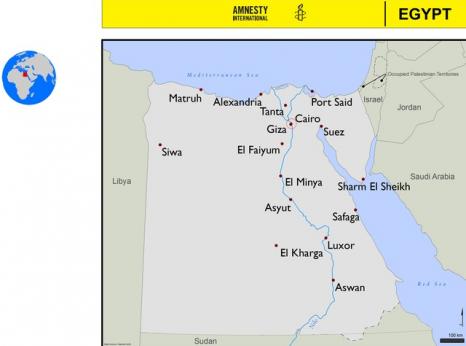Stop Deportation Of Five Eritreans From Egypt

Egyptian authorities arrested 18 Eritrean nationals, including children and infants, on 24 October 2019 while they were trying to enter Egypt from Sudan through an irregular border crossing. They were detained at al-Qusayr police station since December 2019. On 18 December 2019, Egyptian security forces transferred the group to the Eritrean embassy in Cairo without their consent and despite their well-founded fears of being targeted by the Eritrean authorities. The Eritrean embassy issued passports for 15 of them. Between 31 October and 18 November, the Egyptian authorities deported the 15 Eritreans who were issued with passports. Mohamed Nour Ammar, Samar Mohamed Nour Ammar and Salem Tawlidi Adhanom remain held at al-Qusayr police station, apparently because the Eritrean embassy has not delivered their passports yet halting the deportation procedure.
On 30 October, eight members of the group, namely: Hamed Adam Ali, Entesar Hamed Adam, Neama Hamed Adam, Saed Hamed Adem, Mussa Hamed Adam, Sadia Hamed Adam and her sons Kamal Adam Ali and Fares Adam Ali, three and five years old respectively, were taken from al-Qusayr police station to the city of Safaga for Covid-19 vaccines and PCR tests. They were then transferred to Cairo in preparation of their deportation, which took place on 31 October. On 17 November, similar procedures were taken in relation to seven other members of the family including five children namely: Khadija Idriss Abdallah, Najet Hamed Adam Ali, 16-year-old Jamila Hamed Adam Ali, 14-year-old Thawria Hamed Adam Ali, 10-year-old Manal Ahmed Othman, six-year-old Erij Ahmed Othman and four-year-old Samer Ahmed Othman.
Prior to their deportation, authorities denied them access to adequate medical care or sufficient food including for the children. They also failed to provide them with access to interpreters, even though they did not speak Arabic. They were denied the right to legal representation, not brought in front of any judicial body and held without charge or trial. The authorities also prevented them from submitting requests for registration with the United Nation High Commissioner for Refugees (UNHCR). Informed sources told Amnesty International that officials told the group that they were not permitted to do so while detained. Their families tried registering them but said no response from the UNHCR was received.
The 18 fled Eritrea to escape indefinite military conscription, one of the main drivers compelling people to flee Eritrea. According to a 2016 Amnesty International report, deserters are likely to face prolonged arbitrary detention, inhumane detentions conditions, torture and other ill-treatment. Their forced return to Eritrea violates the principle of non-refoulement, which under international human rights law, guarantees that no one should be returned to a country where they would face torture, cruel, inhuman or degrading treatment or punishment and other irreparable harm.
According to an Egyptian refugee rights' organization, at least 49 other Eritreans are at risk of deportation after being arbitrarily detained in 2021 for irregularly entering Egypt. In December 2021, they were forcibly transferred to the Eritrean embassy in Cairo to issue their passports as a prelude to their deportation.